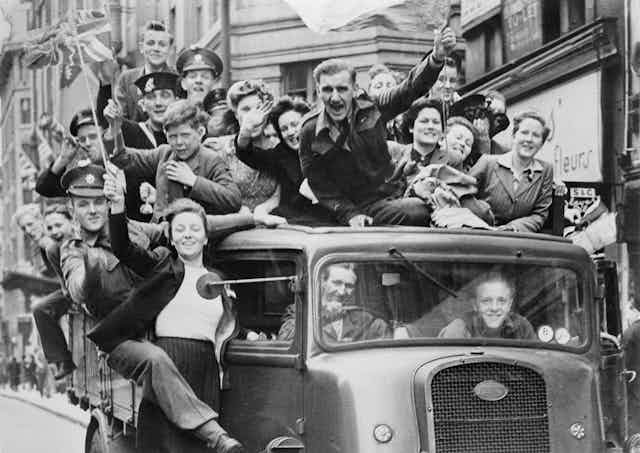The popular image of VE Day is as familiar to the British people even today as Spitfires over Kent or Winston Churchill glowering into the camera. Huge crowds dancing in the streets, people climbing lamp posts, wading in the fountains in Trafalgar Square and everyone waving flags. There were Union Jacks, Stars and Stripes, even French Tricolours – ribbons in red, white and blue were available off the ration for the occasion, though some spivs made a killing by selling it at vastly inflated prices.
The songs of VE Day are familiar too, if only as period pieces: Knees Up Mother Brown, Bless ‘Em All, the Hokey Cokey and Roll Out the Barrel, played on this occasion by a young Humphrey Lyttelton on his trumpet while being pushed along on a handcart.
After six years of having put up with rationing, shortages, blackouts, bombing and the ever-present fear of death – either your own or of someone you loved – suddenly the British people let their hair down in spectacular fashion.
They crowded to Buckingham Palace and demanded to see the king; they cheered Churchill to the skies as he saluted them with his famous V for Victory sign – and they did so secure in the knowledge that, not only had they survived the war, but they had won it and, moreover, they had been right to win it.
Victory in a ‘just war’
The weeks leading up to the German surrender in Europe had brought an unexpected shock as allied armies overran Germany’s concentration camps. The notorious killing centres of Auschwitz and Majdanek were uncovered by the Russians, but the Americans were horrified by what they found in Dachau and Buchenwald; and the British, who had a film crew and a BBC reporter with them, by the horrific scenes they encountered in Belsen.
Read more: Why Bergen-Belsen's 1945 liberation is ingrained in British memory
The footage from Belsen was shown in cinemas and caused widespread revulsion: some people left in tears and there was anger when some well-meaning cinema managers tried to soften its impact by following it with a Donald Duck cartoon. But this shocking evidence of the true nature of Nazi rule merely served to underline that – in this war at any rate – Britain had undoubtedly been on the right side. It’s a message that has been repeated and stressed ever since.
This image of victory in a just war is important because, inevitably, the current pandemic, like every other crisis Britain has gone through since 1945, has been compared to the war. With the queen’s channelling of Vera Lynn at the close of her televised address, and Boris Johnson, himself a biographer of Churchill, calling on us all to show the same resolution as the wartime generation, it is inevitable that people still facing a deadly enemy should seek solace in the heroic memory of VE Day, a simpler time, when our leaders were giants and right and wrong were easy to know.
End of empire
But, of course, it was nothing like so simple. VE Day marked the end, not the summit, of British military power: the patriotic exuberance of the day could not hide the fact that the war had been won by American and Soviet military muscle: even Churchill’s day was over - he would be voted out of office only a few weeks later.
The German surrender tried to divide the allies: a partial one to Britain’s General Bernard Montgomery followed by a full surrender to his US counterpart Dwight Eisenhower, and only then – with great reluctance – to the Russians. This foreshadowed the new global divisions of the cold war, in which Britain would play only a secondary role.

The fighting had carried on right up to the moment of surrender and in some cases even afterwards, so that some people in Britain learned of a loved one’s death shortly before VE Day, or even on the day itself. Not surprisingly, they did not feel like celebrating.
Prisoners of war, returning from a captivity which was a lot harsher than the jolly escape films suggest, similarly tended to want to return home quietly rather than dancing in the street. Adjusting to life after years of separation was not easy and the divorce rate soared after the war.
Above all, there were those with good reason to hold back with some distaste, because their war was far from over. The war in Asia was still going on, and as the Japanese were driven back in Burma and across the Pacific, so their resistance toughened and casualties mounted. For those with a father or husband in the far east, VE Day seemed a cruel mockery.
But perhaps most surprising – and most instructive for today – were those who could not bring themselves to celebrate because the war was their life. Young people had known nothing else since childhood; young women had had opportunities to pursue fulfilling and important work beyond anything peacetime could offer. For many people, ending the war meant letting go of a world they knew for a new and very uncertain one. Adversity – and even lockdown – can carry its own unexpected comforts.

